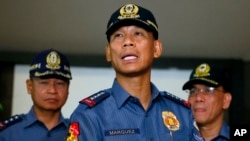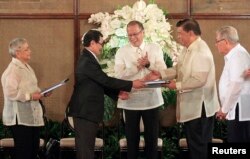An insurgency group-turned-kidnap for ransom gang has been highly active in the southern Philippines in recent weeks, with several abductions of foreign nationals and now the beheading of a Canadian hostage.
In a joint statement released Tuesday, Philippine military and police vowed “no let-up” in their pursuit of members of the Abu Sayyaf Group (ASG). The group, which started in 1991 with funding from al-Qaida, has mostly abandoned its ideological leanings in favor of lucrative kidnappings. It is believed to be holding more than 20 foreign nationals, in addition to Filipinos, for ransom.
Renewed travel warnings
The latest abductions prompted the United States and the United Kingdom to reissue travel warnings urging their citizens to avoid Mindanao island, which is where groups like the Abu Sayyaf are most active.
Philippine military Public Affairs head Colonel Noel Detoyato pointed to stepped up operations against the ASG since the fall of 2014. But he said the military is now contending with challenging factors that have prevented it from completing the mission.
Money not ideology drives this group
“They are making money out of kidnap for ransom, so it is very easy for them to entice people to join them,” said Detoyato. “And right now on our operations, we rely on the information that we can get- [which is] no longer from the community because we cannot get reliable information from the community because [ASG is] supporting them.”
The head of communications for President Benigno Aquino said in a statement Tuesday the president ordered “security forces to apply the full force of the law to bring these criminals to justice.”
Presidential Communications Secretary Sonny Coloma said Monday Aquino had directed the military and police to rescue the ASG hostages hours before a 3:00pm deadline set by the kidnappers.
Matt Williams, who heads Pacific Strategies and Assessments, a Manila-based risk analysis consultancy to potential Philippine investors, said the military is capable of taking care of the kidnap for ransom problem.
But he said the problem is a lack of political will and that Aquino’s call Monday to rescue the hostages was “too little too late.”
Williams said, “He’s had six years to do this and launching massive military campaigns while there’s 20 hostages held, is perhaps not the right time to do that.”
Kidnappings in area that has seen conflict for years
ASG and other sources of conflict continue to operate in a restive part of the country where the largest Muslim rebel group is working out a peace deal with the government.
Peace negotiators from both the government and the Moro Islamic Liberation Front (MILF), the country’s largest Muslim rebel group, have long contended that supporting efforts for the Muslim rebels to realize their goal of self-determination would put an end to criminal elements in the conflict-riddled south.
Islamic groups say lack of peace deal hampers their control over kidnappings
The MILF, which is working out terms of a recent peace deal with the government, is keeping watch over developments with the ASG. The peace process with the MILF came to a halt in February when lawmakers failed to pass a proposed measure that would create a self-governing region.
The ASG, which is an offshoot of another rebel faction the Moro National Liberation Front, that made a peace pact with the government in 1996, was not part of the peace talks with the MILF.
Mohagher Iqbal, peace panel chair of the MILF said government had to act because without the self-governing ability the MILF would not be able to keep groups like the Abu Sayyaf in check.
“But now we don’t have that legal authority… So what can we do? All the efforts that we are capable of doing is very limited,” said Iqbal.
Big time profits rule
Analysts say most efforts against the Abu Sayyaf are no match for the massive profits that kidnap-for-ransom activities bring in. In late 2014 ,the Abu Sayyaf set free two German hostages and claimed it had received more than $4 million for their release. The Philippines, which has a no ransom policy, did not confirm whether the amount was paid.
Philippine Institute of Peace Violence and Terrorism Research executive director Rommel Banlaoi said even with military operations against it, the ASG is able to replenish its membership, which he loosely estimates is around 500.
“ASG through the years has proven its capability to deliver money to new recruits and this money largely is coming from kidnap for ransom activities,” he said. “And right now Abu Sayyaf Group has already received the image of being macho in the area, so all violent groups want to be associated with the Abu Sayyaf Group now.”
One of the leaders of the ASG recently pledged allegiance to the Islamic State, but analysts and the military do not see much weight behind the declaration.
But Williams said, "This is not ISIS, in any way. They're not making political statements here. They want the money."






